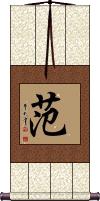Many custom options...
And formats...

Not what you want?
Try other similar-meaning words, fewer words, or just one word.
Feel free to email me with your request. If it's easy, I'll translate it for free and add it to this database of calligraphy for you.
Fan Han in Chinese / Japanese...
Buy a Fan Han calligraphy wall scroll here!
Fan / Han
范 is a Chinese surname that romanizes as Fan, or a Japanese surname that romanizes as Han.
This can also be a personal name, Fan, in Japanese.
This is not the only character or name that romanizes as Fan or Han, so please ensure you are picking the correct character before you order.
This in-stock artwork might be what you are looking for, and ships right away...
Gallery Price: $60.00
Your Price: $36.88
Not the results for Fan Han that you were looking for?
Below are some entries from our dictionary that may match your Fan Han search...
| Characters If shown, 2nd row is Simp. Chinese |
Pronunciation Romanization |
Simple Dictionary Definition |
范縝 范缜 see styles |
fàn zhěn fan4 zhen3 fan chen Han Shin |
Fan Zhen (c. 450-c. 510), philosopher from Qi and Liang of the Southern dynasties, as atheist denying Buddhist teachings on karma and rebirth Fan Zhen |
後漢書 后汉书 see styles |
hòu hàn shū hou4 han4 shu1 hou han shu gokanjo ごかんじょ |
History of Eastern Han (later Han), third of the 24 dynastic histories 二十四史[Er4 shi2 si4 Shi3], composed by Fan Ye 范曄|范晔[Fan4 Ye4] in 445 during Song of the Southern Dynasties 南朝宋[Nan2 chao2 Song4], 120 scrolls (work) Houhan Shu; The History of the Later Han; (wk) Houhan Shu; The History of the Later Han History of the Latter Han |
Variations: |
han; fan ハン; ファン |
(counter) {mahj} han; fan; unit that doubles the score of a hand |
至那僕底 see styles |
zhì nà pū dǐ zhi4 na4 pu1 di3 chih na p`u ti chih na pu ti |
Cīnapati, Lord (from) China, said in the Record of Western Lands 西域記 to have been appointed by the Han rulers; a country so-called because the son of 蕃維質 Fan Weizhi of 河西 Hexi dwelt (and reigned) there. Eitel says, 'A small kingdom in the north-west of India (near Lahore) the inhabitants of which asserted (A. D. 640) that their first kings had come from China.' |
石門洪覺範林間錄 石门洪觉范林间录 see styles |
shí mén hóng jué fàn lín jiān lù shi2 men2 hong2 jue2 fan4 lin2 jian1 lu4 shih men hung chüeh fan lin chien lu Sekimon Gukaku Han rinkanroku |
Shimen Honguie Fan linjian lu |
The following table may be helpful for those studying Chinese or Japanese...
| Title | Characters | Romaji (Romanized Japanese) | Various forms of Romanized Chinese | |
| Fan Han | 范 | fan / han | fàn / fan4 / fan | |
Successful Chinese Character and Japanese Kanji calligraphy searches within the last few hours...








